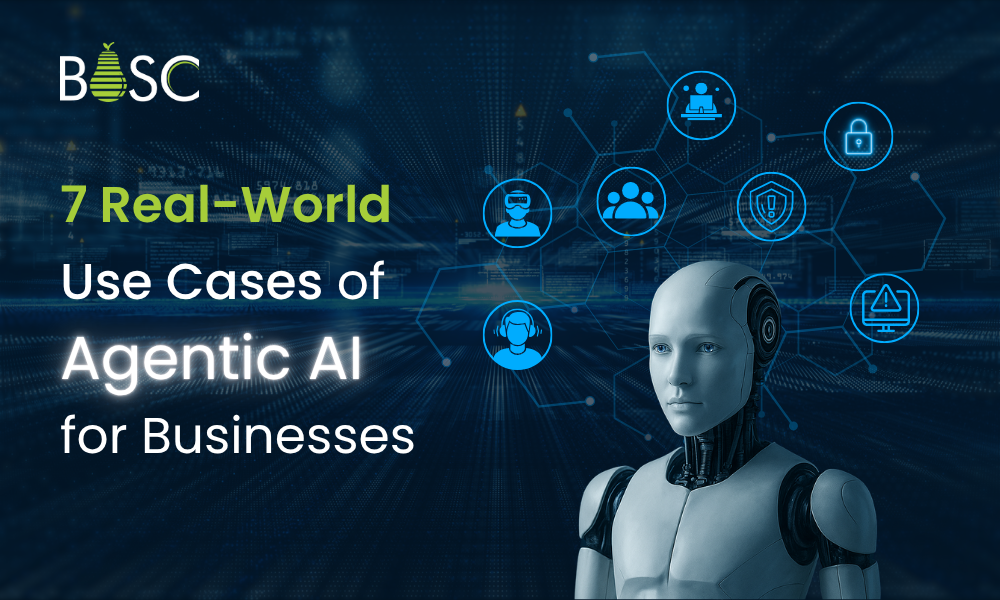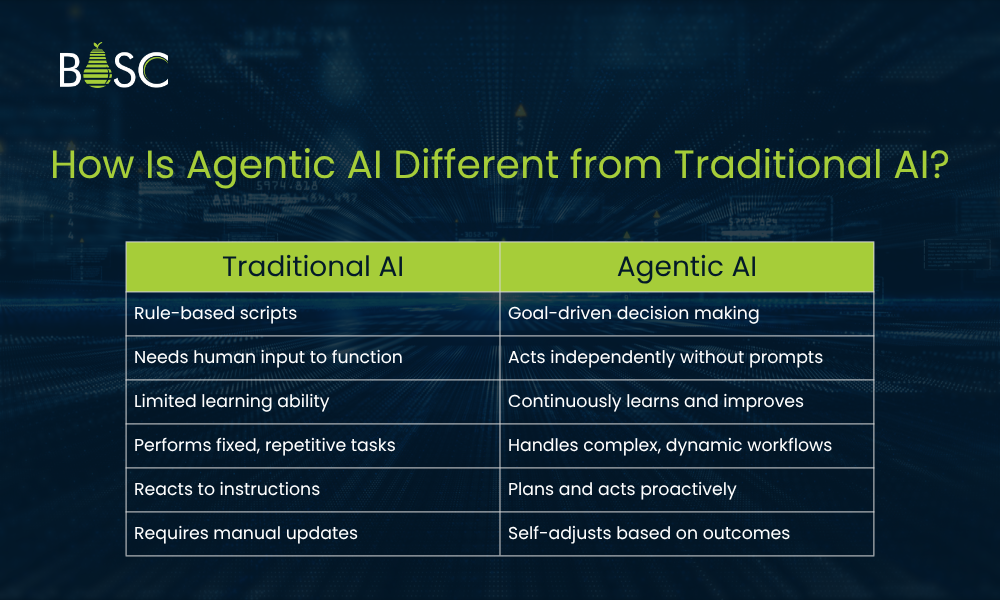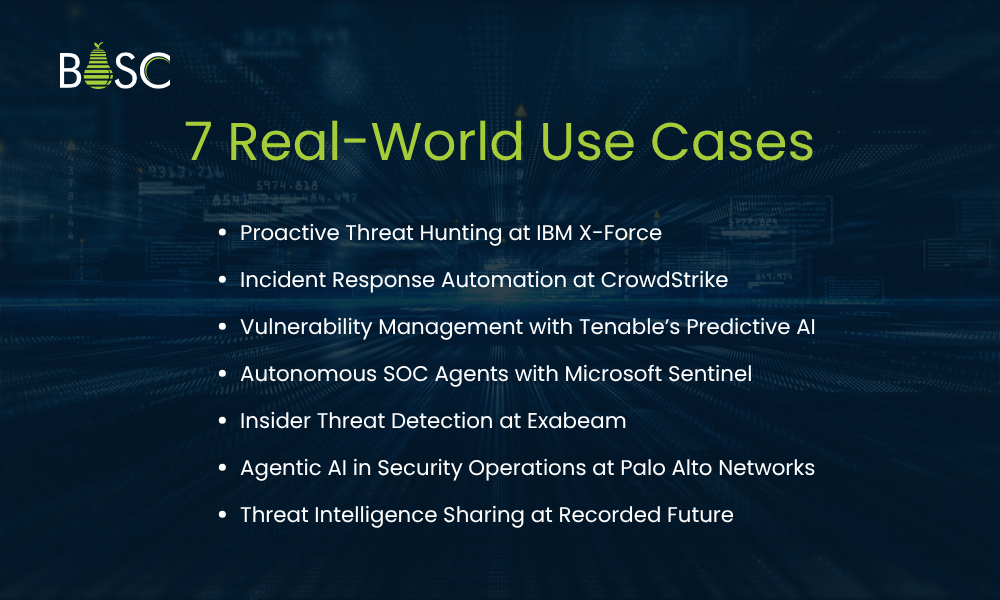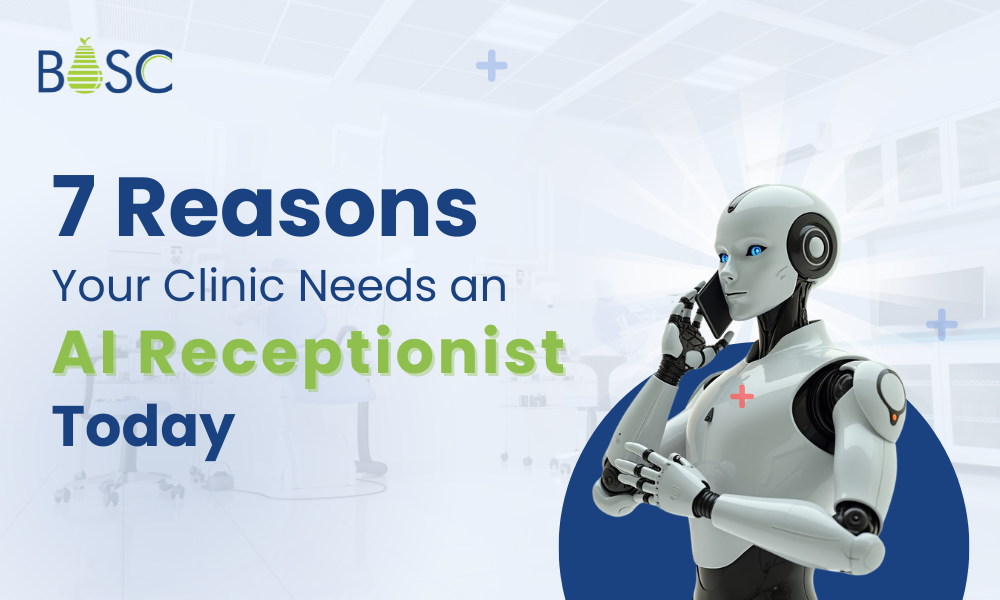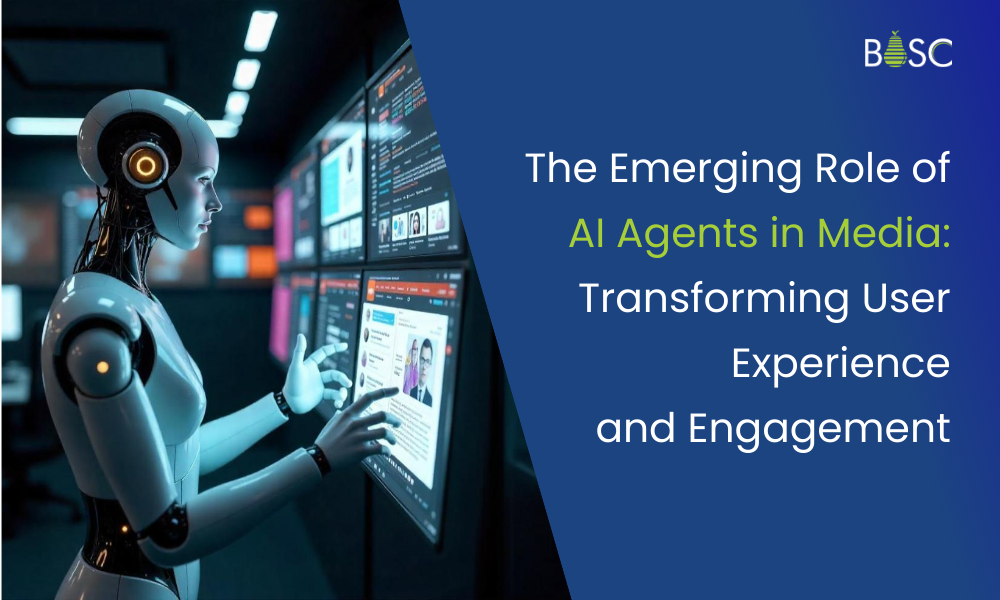Imagine a technology that doesn’t just follow instructions—but actively thinks, plans, and takes action.
Welcome to the era of Agentic AI, where intelligent agents are transforming cybersecurity, business operations, and automation like never before.
Unlike traditional chatbots, Agentic AI can independently hunt threats, respond to incidents, and learn from real-time data—without waiting for human input.
In the case of cybersecurity in particular this has opened up a new range of possibilities, the likes of which include proactive threat detection, complete incident response, as well as vulnerability management. In this article, we’ll dive deep into 7 real-world use cases of agentic AI for businesses that go way beyond answering queries and generating responses.
It is time to discuss the use of these intelligent agents to transform security operations in the most popular organizations and platforms. Want to build secure, scalable AI agents tailored to your business needs? BOSC Tech Labs helps you develop custom agentic AI solutions—from virtual assistants to autonomous cybersecurity bots.
What is Agentic AI? A Quick Overview
Now, before the use cases, let us clear the air on what we actually mean by agentic AI.
An agentic AI is also known as autonomous AI systems (or, agents) which can work without any external control to accomplish specially-skilled tasks. These systems are not only responding to prompts. Gartner predicts that agentic AI will autonomously resolve 80% of common customer service issues by 2029, reducing operational costs. They:
- Analyze data in real time
- Make decisions based on goals or rules
- Learn from feedback
- Adapt strategies without human involvement
Combined with cybersecurity tools, such agents will be able to serve as unwearying digital guards, engaging in all-the-time vigilance, evaluation and elimination of risks.
How is Agentic AI Different from Traditional AI?
Most traditional AI tools rely on predefined rules and need constant human input. While they help automate repetitive tasks, they don’t make independent decisions.
Agentic AI, however, brings full autonomy into the picture. These systems act on their own, adjust strategies, and continually improve through real-world feedback.
If you’re exploring how this next-gen tech impacts business workflows, you can also read our guide on use cases for generative AI in customer service.
While traditional AI has helped automate basic tasks, it still relies heavily on human input and static rules. But the game is changing. Agentic AI introduces a new era of intelligent systems—ones that not only respond to data but also make decisions, take action, and continuously improve on their own. Below is a comparison that highlights how agentic AI goes beyond traditional AI in terms of capability, autonomy, and impact.
Let’s now explore 7 use cases of agentic AI in cybersecurity that demonstrate how powerful this technology can be.
1. Proactive Threat Hunting at IBM X-Force
IBM X-Force is at the head of the pack to employ agentic AI to anticipate threats before they happen.
The X-Force platform examines big amounts of unorganized data on the dark web forums, social media, malware sandboxes, and threat intelligence feed. These data sources are scanned by the agentic AI systems independently of any human action to find the patterns, and fix the priorities on the threats that have not been reported officially.
Business Impact:
- Malware is not able to exhaust itself within the system as agents identify signs of compromise (IOCs) prior to the completion of execution.
- Security teams get notifications concerning the emerging threats that could not be detected by conventional antivirus programs.
- Observations in real-time based on numerous data without human interaction.
Such a case is an illustration of the best-case proactive agentic AI threat detection examples, where AI isn’t waiting for a trigger—it’s actively hunting.
2. Incident Response Automation at CrowdStrike
Sometimes incident response may need speed, precision and coordination. The agentic AI in CrowdStrike Falcon Fusion platform can be deployed to handle end-to-end security operations.
Agents can independently:
- Identify malware infections
- Isolate affected devices
- Block malicious IPs or URLs
- Notify SOC teams and escalate only when necessary
Such an automation is what an agentic AI incident response automation implies. Instead of following pre-established scripts, the agents will instead engage in a dynamic response in regards to the context of the threat.
Business Impact:
- Shortens Mean Time to Detect (MTTD) and Mean Time to Respond (MTTR)
- The reduction of human error in the escalation of incidents Minimizes human error in incident escalation
- Preventing threats within the business-critical systems allows keeping them online
3. Vulnerability Management with Tenable’s Predictive AI
In large IT environments, thousands of new vulnerabilities appear daily. Tenable predictive agentic AI prioritizes vulnerability according to the exploitability, impact and the importance of the asset.
Rather than creating massive to-do lists for security teams, agentic AI systems in Tenable:
- Prioritize high-risk CVEs (Common Vulnerabilities and Exposures)
- Recommend mitigation strategies
- Track remediation timelines and validate fixes
That is in line with agentic AI vulnerability management in cybersecurity area where an autonomous decision can facilitate patch management more efficiently in a hybrid setting.
Business Impact:
- Cuts down time spent on false positives
- Ensures compliance with industry regulations (like PCI-DSS, HIPAA)
- Reduces risk exposure window dramatically
4. Autonomous SOC Agents with Microsoft Sentinel
Security Operations Centers (SOCs) are infamous when it comes to alert fatigue and personnel burnout. Microsoft Sentinel solves this with autonomous Agentic AI agents for SOC teams.
These agents perform tier-1 and tier-2 triage tasks such as:
- Investigating security alerts using data fusion
- Correlating events across cloud, network, and endpoint logs
- Executing automated playbooks to respond to common threats
By giving agents decision-making capabilities, Sentinel reduces the human workload and amplifies threat response speed.
Business Impact:
- Enhances analyst productivity
- Improves detection of lateral movement and stealthy attacks
- Allows 24/7 monitoring without scaling human teams
5. Insider Threat Detection at Exabeam
Exabeam can use behavioral agentic AI to find insider risks which are a common risk which traditional SIEMs can easily miss.
Its agents analyze:
- The User and Entity Behavior Analytics (UEBA)
- Access, file movement and log in times anomalies
- Anomaly detection by departing already established baselines to detect rogue insiders
It is these contextual insights that have become the basis of exabeam agentic AI security solutions which allow real time detection and response that does not require pre-programmed signatures.
Business Impact:
- Eliminates leakage of data and misuse of privileges
- Rapidifies the development of research concerning abnormal behavior
- Develops background of forensic audits
6. Agentic AI in Security Operations at Palo Alto Networks
How agentic AI works in security operations is best demonstrated by Palo Alto’s Cortex XSOAR platform.
Agents in Cortex:
- Aggregate, match and augment threat data platform-independently
- Firewall, SIEMs, and endpoint detection workflows can be triggered
- Real-time update of analysis on the threat indicators
This is in contrast to the traditional automation that does not adjust according to changing variables (not counting the sensitivity of the asset in question, confidence of the threat score, or impact on the business).
Business Impact:
- Quickened threat control and remediation
- Efficient analysts workflow
- Better scale of operation efficiency
7. Threat Intelligence Sharing at Recorded Future
Speed of sharing threat information is cogent in the present globalized world. Recorded Future takes this process to an AI operator level (agentic AI) automating the entire process.
Agents in their platform:
- Constantly search and derive threat intel in open net, dark net, and technical sources
- Assess the credibility of sources autonomously
- Push real time updates to client SIEMs and SOAR tools
The use case will be among the broadest possible agentic AI cybersecurity real-world use cases since the agents can have the ability to discover, verify and disseminate information on their own.
Business Impact:
- Minimizes time of consumption of threat intel
- Enhances offensive defensive stance
- Fits easily in current tech stackers
Why Businesses Should Care About Agentic AI
These applications, listed above, are not merely a demonstration of technical genius: they have real business value:
- Operational Efficiency: Tasks that took hours now happen in seconds.
- Security Posture: Threats are addressed before causing damage.
- Human Focus: Analysts will not have to go through alerts but are able to focus on strategy.
- Scalability: Businesses can scale security without ballooning team sizes.
In the case of bank, healthcare, e-commerce, and telecoms, agentic AI provides a strategic advantage that would shield the brand, consumer trust, and regulatory conformance.
The Future: Agentic AI Beyond Cybersecurity
Although this article is devoted to cybersecurity, the principles of agentic AI can be used in all functions:
- Finance: Autonomous agents that optimize portfolios based on real-time market trends.
- Supply Chain: AI agents rerouting the shipments in case of the disruptions.
- HR: Agents that screen candidates and schedule interviews autonomously.
- Marketing: Systems that create and launch campaigns on the basis of sentiment data.
In every field where intelligent action is needed without micromanagement, agentic AI is poised to dominate.
Conclusion:
Agentic AI is not just a futuristic concept—it’s already redefining how businesses defend, operate, and grow. From proactive threat detection to autonomous response systems, Agentic AI enables a shift from reactive to autonomous defense. Its applications go far beyond cybersecurity—empowering marketing, HR, finance, and operations with intelligent automation.
The importance of agentic AI will further increase in such a scenario because companies will continue investing in complex security systems. Bosc Tech creates custom AI agents for scalable business automation and makes the appeal to use the technology stronger than ever before.
They build AI agents that supercharge businesses and boost accuracy, productivity, and operational efficiency. Also, they empower your business with precision and seamless AI integration.
Smart companies which adopt agentic AI, will not only reinforce their cyber defenses, but also position themselves to be resilient in the AI-first world.

